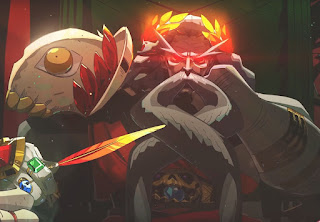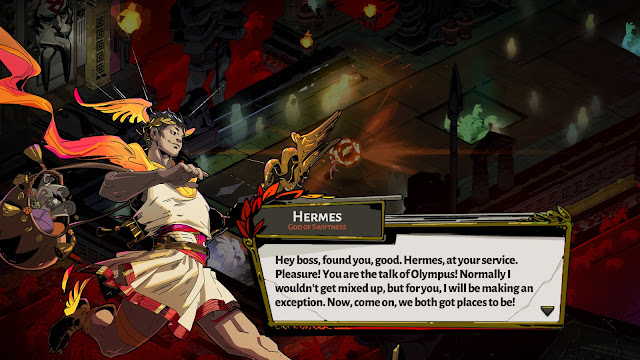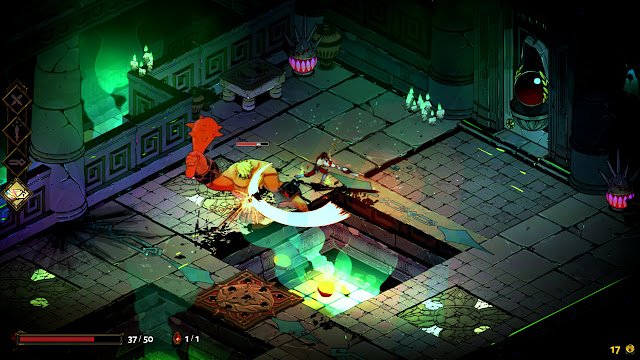“Great, it’s another action roguelike from a small developer.” That was my immediate reaction to Hades, because while Hades was the latest project by a talent as consistently great as Supergiant Games, and while the screenshots and video footage certainly looked lovely, there have been so many “action roguelikes” that it’s difficult to become enthusiastic about any newcomers treading the familiar ground. Thankfully I decided to give it a go anyway, and was quickly reminded about why roguelikes are, at their best, so utterly compelling.
I want to start with the treatment of Greek mythology, because that’s really where the appeal of Hades starts. You play as Zagreus, the son of Hades and a deity in his own right (his portfolio includes “rebirth,” which, in the context of a roguelike, is a clever touch). Zagreus wants out of hell (fair enough) and so sets out to smash up as much of the underworld as he can until he can escape. The problem is, however, that the underworld is a hostile place and most of his attempts are doomed to failure, even when he can count on the help of various deities and beings of Greek mythology on the way. Here’s where Hades’ narrative gets interesting, because each time one of these deities drops Zagreus a new ability or upgrade, it’s accompanied with a short interaction that is entirely appropriate to the specific god. Thanks to the random nature of the roguelike, when these events come by they can be a cause to celebrate… assuming the deity has something that you’re looking for, and before you know it, you’ll be grinning when Artemis drops by to give you that much needed bow upgrade, and you’ll frown when one of the more mischevious deities’ idea for a boon is something rather unwieldy.
The deities of Greek mythology did have that reputation for being capricious and flighty, and the effect of having them play such a substantial role, but so unpredictably, goes a long way to enhancing their personalities in-game to suit the mythological basis. There’s also a broader narrative of Zagreus’ relationship with his father and the abusive connotations that come with it (you’ll discover the truth of that for yourself), but for me it was those small cameos and “name drops” that really gave me the narrative context to set the scene. It helps that they’re drawn gorgeously, of course, but the artistic vision is almost secondary to the narrative role that each character, and for a roguelike – a genre not really know for deep and potent storytelling – to achieve a nuanced, informative narrative and understanding take on the classic mythology is impressive work indeed.
Equally nuanced is the music, and while I’m not usually one to single out an individual component within a video game as though it can be analysed as a component to the game, in isolation, Hades has such a smouldering, earthy rhythmic quality that it’s really quite hypnotic. About half of the soundtrack seems to have been directly inspired either by Latin American or Middle Eastern dance rhythms, and that’s the kind of music that you can feel. Before you know it, you find that the music is subtly guiding your movements, with the action naturally and organically fitting in to those beats, creating explosions of movement that pairs to the background music with complete precision. I’d go as far as to suggest that there’s more than a little rhythm game in Hades – you won’t get a “game over” directly from playing with no rhythm, but tap into that earthy vibrancy and you’ll find that you’re playing the game the way it wants you to to your benefit. Then, ever so often, the soundtrack subverts itself with more rocky or balladic music, which helps to lend the action an emotional gravitas at just the right moment.
More than any other game from Supergiant Games to date, Hades is one where everything about the aesthetics are bent in service of the game and its higher concepts. It’s not just that the game looks good, has fast-flowing action, has interesting enemy and character designs, and an excellent soundtrack. It’s that every one of those elements is carefully placed, with extreme care, to connect the player to everything in the world. “Immersion” is a terrible word in art criticism that is thrown around innacurately to describe something that you just really enjoyed and spent a lot of time playing. Hades, however… there’s a feverness and density to the vision that wants you to drown in it. It almost works to the game’s disadvantage as a sensory overload, but Hades remains just on the right side of comfortable, while remaining saturated in its deeply distinctive and seductive aesthetic.
Hades really is very difficult to put down. Like any roguelike, the idea is to plunge as deeply as you can through the “levels” before, eventually, the monsters and traps will prove overwhelming. At that point you need to restart, with the singular goal of getting further in the next attempt. There are some permanent progression systems which make subsequent “runs” easier, but the death-and-rebirth core is baked into the experience and you’re only ever meant to do incrementally better. What helps Hades stand out is that much of the “doing better” involves understanding how to play better. With some roguelikes, it’s a grind. If you’re not up to X level or have Y equipment you’re going to get creamed by the monster at level Z. With Hades, bosses and most new enemies are incredibly threatening, as you haven’t learned their tricks and traps yet. Once you’ve learned them, however, even a powerful boss becomes easier, as practice has mean that you become familiar with how to stay out of their way. Hades remains a challenging game, but the challenge is placed on the player’s ability in a way that feels much more engaging and dynamic than with many other roguelikes.
– Matt S.
Editor-in-Chief
Find me on Twitter: @mattsainsb
The critic was provided with a copy of this game for review.











